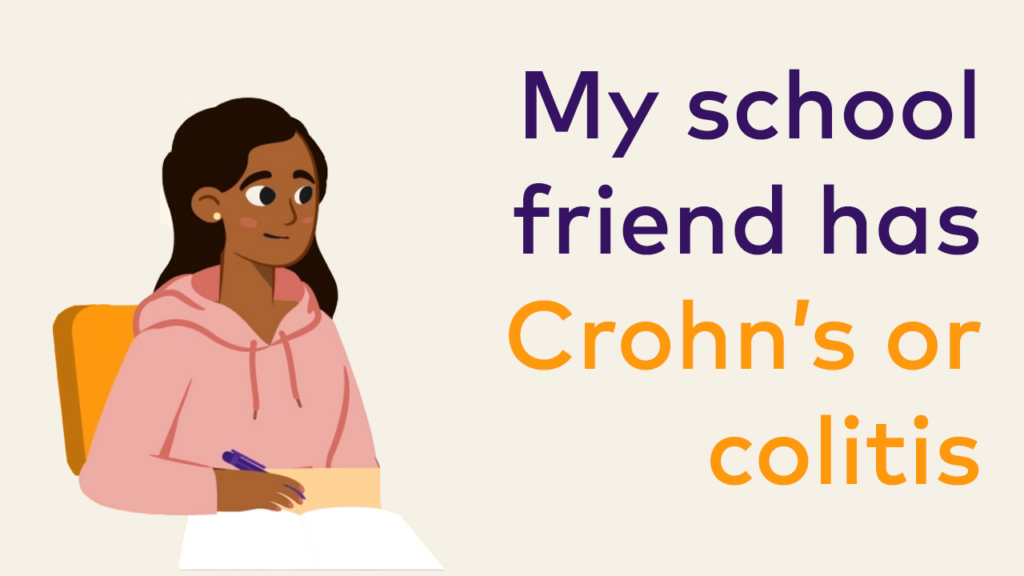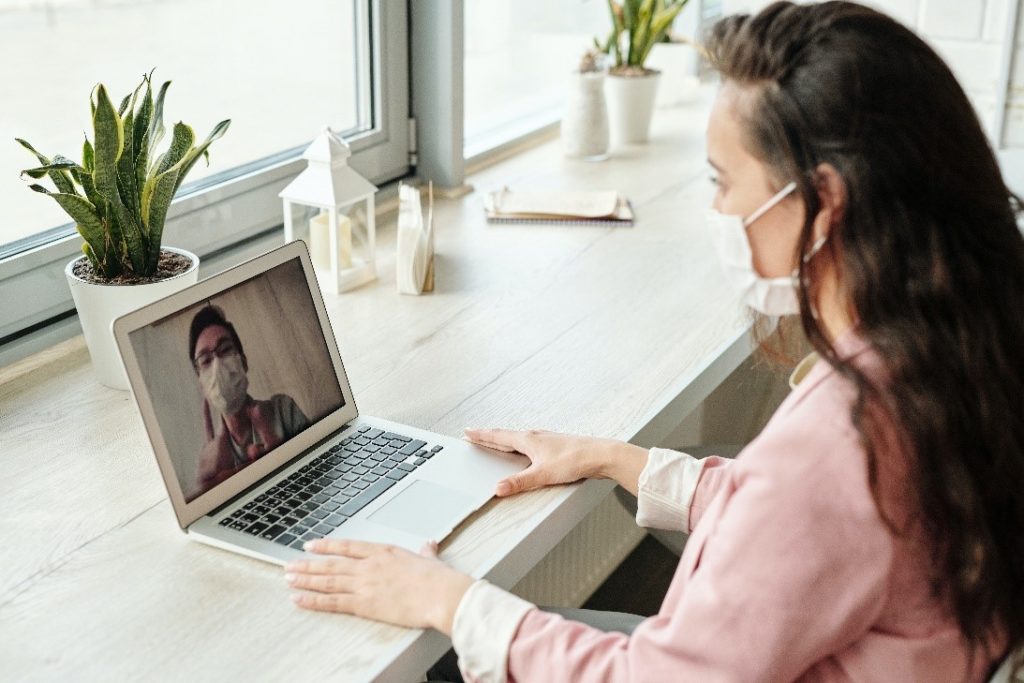Teens (12-18 years)
What is inflammatory bowel disease?
It is normal to get stomach aches every now and again, but if you have inflammatory bowel disease (IBD), you can get bad stomach pain and diarrhoea more often. Crohn’s disease and ulcerative colitis are the two main types of IBD. IBD is a chronic condition, which means it is a long-term condition. IBD causes inflammation in parts of the bowel. Inflammation is the body’s response to injury or irritation, and can cause redness, swelling and pain, and in the bowel, this can cause a problem with gut function.

Key Points
- Tests may not be able to tell whether your IBD is Crohn’s disease or ulcerative colitis.
- If you have signs of both Crohn’s and ulcerative colitis you may get a diagnosis of IBD unclassified.
- IBD unclassified may change over time and become Crohn’s disease or ulcerative colitis.
How do I know if I have IBD?
Diagnosing inflammatory bowel disease (IBD) can be difficult for anyone experiencing Crohn’s or ulcerative colitis symptoms. You may need lots of tests to check if your gut has signs of inflammation. Some tests look at your blood or your poo. You may also need a test called an endoscopy, which is when a doctor uses a special camera to look at your bowel. Your doctor may also include imaging tests such as an MRI scan, or ultrasound.
It’s important to know that irritable bowel syndrome (IBS) and IBD are different. While IBS can cause similar symptoms to IBD, like stomach pain and diarrhoea, it does not cause inflammation or damage to a person’s intestines like IBD can.

When someone has features of both Crohn’s disease and ulcerative colitis, it can be hard to figure out which type of IBD is causing the symptoms. If this happens you may be tested and diagnosed with IBD unclassified.
If you are diagnosed with IBD unclassified as a child, it may change over time to be identified as Crohn’s disease or ulcerative colitis as you grow older.
Talk to a parent, guardian or your doctor if you feel worried about your diagnosis, symptoms or would like to know more.
Further information
- Learn more about IBD unclassified
About Crohn’s disease
Key points
- Symptoms of Crohn’s disease are different for each person.
- The symptoms you have will depend on the area of inflammation in your gut.
- Common symptoms are gut pain, diarrhoea and tiredness.
- Talk to a parent, guardian or your doctor if you are worried about any of your symptoms.
What are the symptoms of Crohn’s disease?
Symptoms of Crohn’s disease can be different for each person. Symptoms may be serious or mild. The symptoms you experience will depend on the area of inflammation in your digestive system (from mouth to bottom).

When you feel unwell you may feel some of these common symptoms
- Gut pain
- Diarrhoea (sometimes with mucus or blood) and frequent trips to the toilet
- Tiredness
- High temperature, fever (don’t ignore this, seek urgent medical help)
- Not feeling hungry, losing weight
- Anaemia (reduced number of blood cells).
Be alert to the following “RED FLAG” symptoms and seek urgent medical advice:
- Abdominal pain that is not relieved by any intervention
- Passing large amounts of blood with stools, or blood clots multiple times a day
- New perianal fistula or swelling with temperature greater than 38 degrees
- Extensive bloating and pain with either dark green vomit and/or inability to pass stool for more than 48 hours
- Dehydration
- Fever greater than 38 degrees whilst on an immunosuppressant or prednisone
You should seek help in your closest emergency department or see your IBD team urgently if you experience these severe symptoms.
Inflammation in the gut can make it harder for your body to absorb nutrients from food, which can also lead to these symptoms.
Learn more about other conditions connected to IBD.
When you feel unwell you may feel some of these symptoms, but they are not as common:
- Joint pain
- Mouth sores
- Red, swollen or sore eyes
- Yellow skin or eyes
- Feeling like you need to vomit
- Sore or irritated skin, or lumpy red rashes (a rash known as erythema nodosum is most common among people living with Crohn’s disease).
Talk to a parent, guardian or your doctor if you feel worried about your symptoms or would like to know more
Further information
- Learn more about Crohn’s disease
About ulcerative colitis
Key Points
- Symptoms of ulcerative colitis are different for each person.
- Symptoms depend on how much of the large intestine is inflamed and the intensity of the inflammation.
- Common symptoms are gut pain, diarrhoea and tiredness.
- Talk to a parent, guardian or your doctor if you are worried about any of your symptoms.
What are the symptoms of ulcerative colitis?
The inflammation in ulcerative colitis is restricted to the large bowel (colon). Symptoms of ulcerative colitis can be different for each person. Symptoms may be serious or mild. Symptoms will depend on how much of the large intestine is inflamed and the intensity of the inflammation.

When you feel unwell you may experience some of these common symptoms
- Gut pain
- Diarrhoea (sometimes mixed with mucus and blood) and frequent and urgent need to use the toilet
- Tiredness, fatigue
- Raised temperature, fever (don’t ignore this, seek urgent medical help)
- Loss of appetite, weight loss
- Anaemia (reduced number of blood cells).
When you feel unwell you may experience some of these symptoms, but they are not as common
- Joint pain
- Mouth sores
- Red, swollen or sore eyes
- Yellow skin or eyes
- Feeling like you need to vomit
- Sore or irritated skin or lumpy red rashes (a rash known as erythema nodosum is most common among people living with ulcerative colitis)
- Hair loss.
Be alert to the following “RED FLAG” symptoms and seek urgent medical advice
- Severe abdominal pain
- Large amount of blood loss
- Severe restriction of activity
- Nocturnal stooling
- Unformed stools
- Significant increase in frequency, >6 per day
You should seek help in your closest emergency department or see your IBD team urgently if you experience these severe symptoms.
Talk to a parent, guardian or your doctor if you feel worried about your symptoms or would like to know more.
Further information
- Learn more about ulcerative colitis
About IBD unclassified
Key Points
- Symptoms of IBDU are different for each person.
- The symptoms you have will depend on the area of inflammation in your gut.
- Common symptoms are gut pain, diarrhoea and tiredness.
- Talk to a parent, guardian or your doctor if you are worried about any of your symptoms.
What are the symptoms of IBD unclassified?
IBD unclassified can affect everyone differently. The symptoms you feel can be serious or mild. Symptoms will depend on the area of inflammation in your gut.

The most common symptoms are
- Gut pain
- Diarrhoea (sometimes with mucus or blood) and frequent trips to the toilet
- Tiredness
- Raised temperature, fever (don’t ignore this, seek urgent medical help)
- Not feeling hungry, losing weight
- Anaemia (reduced number of blood cells).
Inflammation in the gut can make it harder for your body to soak up the nutrients in food, which can lead to many of these symptoms.
Be alert to the following “RED FLAG” symptoms and seek urgent medical advice
- Severe abdominal pain
- Large amount of blood loss
- Severe restriction of activity
- Nocturnal stooling
- Unformed stools
- Significant increase in frequency, >6 per day
- Abdominal pain that is not relieved by any intervention
- Passing large amounts of blood with stools, or blood clots multiple times a day
- New perianal fistula or swelling with temperature greater than 38 degrees
- Extensive bloating and pain with either dark green vomit and/or inability to pass stool for more than 48 hours
- Dehydration
- Fever greater than 38 degrees whilst on an immunosuppressant or prednisone
You should seek help in your closest emergency department or see your IBD team urgently if you experience these severe symptoms.
Other symptoms, which are not as common, are:
- Joint pain
- Red, swollen or sore eyes
- Yellow skin or eyes
- Feeling like you need to vomit
- Sore or irritated skin or rashes.
Talk to a parent, guardian or your doctor if you feel worried about your symptoms or would like to know more.
Further information
- Learn more about IBD unclassified
Treatment for IBD
Key Points
- Treatments for teens are mostly the same as treatments for adults.
- To avoid the use of corticosteroids, exclusive enteral nutrition (EEN) is a diet that is used to help the bowel heal.
- Talk to your IBD team to get the right treatment for you.
What treatments are available?
There are many different medicines available to treat Crohn’s and Colitis, and it may take some time to figure out what works best for you. There are also many newer medications becoming available to patients with IBD.
Treatment may depend on how severe your symptoms are, and how much of your gut is affected. Some medicines may be short or long term.

Many of the treatments available to teens with IBD are similar to the treatments used for adults, and can include medication that:
- controls severe inflammation
- reduces or eliminates your symptoms
- modifies the immune system to reduce the inflammation
- lowers pain
- gives the body missing vitamins and minerals.
Other safe treatment options for teens
Exclusive enteral nutrition (EEN) is a safe treatment for young people with Crohn’s disease. It involves drinking a specifically balanced formula, instead of drinking and eating usual food, for a specific period of time. The formula is designed to meet your daily nutritional needs while giving your bowel a chance to heal and return to its normal state. It can also help you to regain the weight you may have lost as a result of your IBD. This treatment is often used for six to eight weeks to switch off inflammation, and is then followed by a different maintenance treatment, to keep you well. Sometimes partial enteral nutrition is used to keep you well.
Talk to a parent, guardian or your doctor or dietitian if you would like to know more.
Further information
IBD and growth
Key Points
- IBD can get in the way of your growth and physical development.
- Good nutrition and exercise can help.
- Inflammation and medication to treat IBD can affect your bones.
- Talk to a doctor about ways to keep your bones healthy and strong.

Crohn’s and colitis can affect your growth and physical development, like your height, bone health and when you reach puberty.
Although IBD can often delay puberty, eventually your body will catch up when your disease is under control. You may notice that you’re not as tall as some of your friends and this could be because you’ve been unwell at times with IBD, or your body hasn’t gained as much nourishment from all the foods you eat or because of medications like corticosteroids.
Girls with IBD may notice their friends’ body shapes are changing and they may be starting to get their periods before they do.
Some guys with IBD may notice their friends’ voices are beginning to get deeper, their bodies getting taller, broader and more muscular and they need to shave their face earlier than they do.
This may cause you to worry if these changes aren’t happening to your body yet. You might feel left behind or different from your friends.
There are some things your doctor may recommend, and it is best to talk with your specialist about any concerns you might have about your growth and development and your IBD.
Steroid medication for IBD may affect the health of your bones and can impact your bone density, which is how strong your bones are. The medical terms for low bone density include osteopenia or osteoporosis. If you have low bone density, you have a higher risk of bone fractures if you have an accident, so it’s important to be aware of some things that you can do to help keep your bones healthy. These include:
- Making sure you’re getting enough calcium – eat calcium-rich foods like milk, cheese, yoghurt, almonds and leafy greens like bok choy and spinach.
- Make sure you’re getting enough vitamin D – spending time outside (with sun protection on when the UV level is 3 or above) can help. Your doctor may also suggest taking a vitamin D supplement.
- Whether you’re on your own or in a team, practice weight-bearing exercises like dancing, walking or running. You could also get involved in a team sport like soccer or netball.
If you have any concerns about your growth or bone health speak to your doctor. They might recommend a scan of your bones to check they are as healthy as they can be.
Help and support for teens living with IBD
Key points
- Negative self-talk can create unhelpful beliefs.
- Reach out for support when you need it.
- Get to know your care team.
- The transition to adult care often happens between the ages of 16 and 18.
- Becoming independent in your health care is an important part of learning to manage your IBD.
Negative self-talk
Self-talk is the way you talk to yourself. It’s your inner voice. When that inner voice becomes too negative and critical this is known as negative self-talk. Negative self-talk can destroy your confidence and stop you from achieving the things you set out to do.
Negative self-talk about our bodies or our self-worth can get in the way and hold us back from living our best life. It can also have a detrimental impact on our mental wellbeing and relationships with others.
Negative self-talk can become repetitive and intrusive. Often this kind of talk is untrue and does not reflect reality. But it can be hard to break out of this kind of self-talk.
Examples of some negative self-talk include:
“I’m broken”
“My body is damaged”
“I can’t …… because my body is ……”
“No one will ever be able to accept me as I am”
Tips to break out of negative self-talk
Recognising negative self-talk, questioning where it’s coming from and then working out what is in your control and not, can be a helpful process. To break the cycle of negative self-talk.
- Recognise negative thoughts for what they are – would you talk like this to someone else?
- Question your thoughts. Is it true or an exaggeration? Maybe there’s another explanation or way to look at things.
- Change your perspective. Try and look at things in a different way.
- Try stopping the thought. Visualise the thought being stopped or squashed.
- Replace the thought with a neutral or empowering thought.
Once you recognise negative self-talk, you can start to challenge unhelpful beliefs about yourself and build empowering beliefs in their place.
This may be something you reflect on yourself, or you may also wish to consider talking to a peer support worker or other healthcare professional such as a psychologist.
Remember, it is possible to manage your condition so you can lead a healthy life.
Embrace empowering beliefs

Making a conscious effort to talk positively to yourself is an important part of creating a more positive outlook on life. Positive self-talk can help you achieve your goals, so you can live your best life.
“I accept my body”
“I am enough”
“I am in control”
“My body is the only one I’ve got, it’s my home, and it deserves love and respect”
“There’s a lot of people struggling, and I’m struggling and it’s ok to have bad days on this life journey”
“I can manage my condition and lead a positive and healthy life”
“I have the power to achieve the things I put my mind to and live a normal life”
Benefits of positive self-talk
Positive self-talk can improve your mental and physical wellbeing, Research shows that positive self-talk can:
- Improve self-esteem, stress management and emotional wellbeing.
- Reduce depression and anxiety.
- Improve your body image.
- Help you feel more in control of your life.
- Help relieve chronic pain.
- Improve your motivation to help you overcome obstacles.
- Help you to relax.
Tips to improve positive self-talk
- Practise. Create a ritual of thinking nice things about yourself.
- Make a list. Identify your good attributes and strengths.
- Accept compliments from others.
- Do something positive, like cooking a healthy meal or helping a friend. or relative to complete a chore, like gardening.
- Spend time with optimistic people.
- Recognise, stop and replace negative self-talk with positive and empowering thoughts about yourself.
Talking to others about IBD

When you’re feeling unwell, attending school and going out with friends may be the last thing you want to do, and there may be times when you have to cancel your plans last minute.
It might be helpful to let your school or friends know about your condition so they can support you when you’re having a flare up – even if it’s from afar.
To guide your conversations with your close friends, stick to the basic facts.
You could start by asking them what they already know about IBD then share some information from our website.
The basic facts will help your friend understand how IBD can affect you and how they might be able to support you. Let them ask questions and if you don’t feel comfortable sharing specific personal information, gently let them know you’d prefer not to go into too much detail.
Be sure to let your friends know if there are specific ways they can support you, for example taking class notes in your absence or arranging IBD-friendly events (ones that have easy access to a bathroom or have healthy menu options).
Our education resources are useful for sharing with teachers.
We have a video about how your school and friends can understand and help you!


Further information
- You can let your friends know about Supporting someone with IBD.
- Learn about Communicating about my IBD.
- Tips on dealing with the fear of missing our (FOMO) and other things you might be worried about.
Reach out
Everyone handles IBD differently. It can be a difficult experience dealing with your thoughts on your own.
Despite their best intentions, people don’t always understand what you’re going through or the reasons why you have to cancel your plans last minute. Some people mistake IBD for having an eating disorder, which can be frustrating and may be distressing.

We know the gut and the brain are closely connected, so when one is not functioning as well it should, the other is also affected.
Talking to someone you trust like your IBD service or GP can help. Your GP can also refer you to a psychologist.
If you get stuck, we’re always here to help!
Crohn’s & Colitis Australia offers telephone support for teens with IBD.
Call 1800 138 029 to speak with our Helpline Coordinator who can help with everyday life/IBD challenges or make a phone appointment with our IBD nurse for more specific health information and guidance. You can also go online to chat with someone who has IBD like you: https://crohnsandcolitis.org.au/connect-with-a-peer/
If it is an emergency call 000.
If you are feeling distressed and wish to speak to someone immediately who can help call:
Kids Helpline on 1800 55 1800 or Lifeline Australia on 13 11 14.
Further information
- Learn more about Psychological Health & IBD
Get to know your care team
It is your healthcare team’s role to work with you to make sure you have the right support, information, and treatment to manage your health.
Your healthcare team is bigger than you might think. It includes your parents, carers, GP, gastroenterologist, IBD nurse, dietitian, psychologist, and may also include a colorectal surgeon, research assistant and any other health professionals.
The transition to adult care

If you’re a young person with Crohn’s disease, ulcerative colitis, or another form of inflammatory bowel disease, the transition to adult care is an important milestone.
The transition process often happens between the ages of 16 and 18, but it may happen earlier or later. Your team will help you determine when you are ready to transition.
It’s normal to feel nervous as you get to know a new care team. It can help if you know what to expect.
Tips for taking ownership of your health care
Everyone is different when it comes to how comfortable they feel making decisions about their health on their own, and this can change over time.

How long you may have been living with IBD, how ‘in control’ you may feel with your condition, how comfortable you feel in talking about your IBD and anything that may be troubling you – these are all factors that may influence your readiness to take ownership of your health care.
Your health care team is there to guide and support you as you transition to adult care. Here are some simple steps to support your transition when you feel ready:
- Ask for a copy of the letter from your current clinic that has the details of your medications and a history of your condition.
- Understand your disease, and its location.
- Understand how your disease is being monitored.
- Know the medications you take, the doses and frequency, as well as the potential side effects.
- Make sure your prescriptions are up to date.
- Know how and where to get help if you are experiencing a flare.
- Before any appointment with a new member of your health care team, write down any questions you might have, as this can help when you start attending appointments on your own.
- These questions may include anything to do with how you manage your IBD, but they could also be about how this team will interact with you. For example, you may want to know things such as the process for making appointments, what to do if you have questions or things you need help with outside of your appointments, or who you can contact outside of regular clinic hours.
- If you forget to ask any questions or have any problems, contact your nurse or doctor. Your clinic will give you an email address or phone number to contact when you need them.
Further information
- Learn more about IBD for kids
- Learn more about communicating with IBD
- Learn more about moving from paediatric care to adult care
- Learn more at ibdtransition.mindovergut.com
- Download the checklist to help with your transition to adult care

Join our new platform to chat with others about your experiences with IBD and bond over fun activities, all while learning more about IBD.